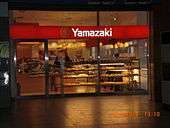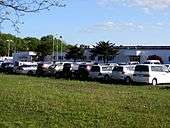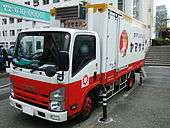Yamazaki Baking
Yamazaki Baking Co., Ltd. (山崎製パン株式会社, Yamazaki Seipan Kabushiki-gaisha) is a Japanese food company and the world's largest bread-baking corporation,[2] that makes bread, bakery products and confectionery.[3] It was established by Tojuro Iijima in Japan on 9 March 1948 and started mass production of bread in 1955.[4]
 | |
 The Headquarters in Chiyoda, Tokyo, Japan | |
Native name | 山崎製パン株式会社 |
|---|---|
| Public KK | |
| Traded as | TYO: 2212 OSE: 2212 |
| Industry | Food |
| Founded | Ichikawa, Chiba (June 21, 1948) |
| Founder | Tojuro Iijima |
| Headquarters | Iwamotochō, Chiyoda-ku, Tokyo 101-8585, Japan |
Number of locations | 107,950 stores |
Area served | Asia, Europe, North America |
Key people | Nobuhiro Iijima (President) |
| Products |
|
| Services | Convenience stores |
| Revenue | |
| Owner | Iijima family (around 12.52% in 2012) |
Number of employees | 17,654 (consolidated, as of December 31, 2014) |
| Website | Official website |
| Footnotes / references [1] | |
History
Yamazaki products can be found in various Asian countries, including Hong Kong, Malaysia, Taiwan, Singapore, Thailand, and China.
In October 1970, the company established a joint venture, Yamazaki Nabisco Co., Ltd. (now known as Yamazaki Biscuits), with Nabisco of the United States and Nichimen Jitsugyo Corporation (currently Sojitz Corporation). By 1988 Yamazaki raised its stake in the joint venture to 80% by acquiring the shares held by Nabisco.[5]
In 1991, Yamazaki purchased Vie de France Bakery division (began in 1971), and in 1994, Yamazaki Baking purchased the Vie de France Restaurant division (began in 1978).[6][7] Yamazaki now operates Vie de France in the United States[8] and Japan[9] under the Vie de France brand.[10]
Until 2014, Yamazaki used potassium bromate in their bread, while all other Japanese baking companies voluntarily stopped using it in 1980 due to suspicions of carcinogenicity.[11]
In 2016, Yamazaki acquired the US company Bakewise Brands, parent of Fleischer's Bagels and Tom Cat Bakery.[12][13]
Gallery
 Yamazaki Baking store in Keelung railway station
Yamazaki Baking store in Keelung railway station Yamazaki Baking factory in Eniwa, Hokkaido
Yamazaki Baking factory in Eniwa, Hokkaido A Yamazaki delivery truck
A Yamazaki delivery truck.jpg) A streetside Yamazaki vending machine
A streetside Yamazaki vending machine
See also
- Daily Yamazaki, Yamazaki's convenience store division
References
- "Company Profile". Yamazaki Baking. Retrieved 2 April 2015.
- John Paul Rathbone (22 November 2010). "Latin America: no longer the man with a moustache and a guitar". Financial Times. Pearson PLC. Retrieved 2 April 2015.
- Stuart D. B. Picken (September 2009). The A to Z of Japanese Business. Rowman & Littlefield. p. 316. ISBN 978-08108-6872-4.
- Kazuo Usui (5 March 2014). Marketing and Consumption in Modern Japan. Routledge. p. 42. ISBN 978-0-415-32313-0.
- Business Japan. 19 (1-6 ed.). Nikkan Kogyo Shimbun. 1974.
- "会社概要." Vie de France. Retrieved on May 18, 2009.
- "About Us – Vie De France". Retrieved 18 June 2020.
- "Vie de France { Retail }". viedefrance.com. Retrieved 18 June 2020.
- "VIE DE FRANCE - Official Homepage". www.viedefrance.co.jp. Retrieved 18 June 2020.
- Jonna Crispens (1 April 1991). "Japanese manufacturer plans to buy Vie de France division". Supermarket News. ISSN 0039-5803 – via HighBeam Research.
- "Japan's Yamazaki Baking to use potassium bromate in bread". Asia Pulse News – via HighBeam Research.
- "Yamazaki Baking buys bagel maker Bakewise Brands". Retrieved 27 October 2018.
- "City Capital Advises Bakewise Brands in Sale to Yamazaki Baking Co., Ltd". City Capital Advisors. 31 January 2017. Retrieved 18 June 2020.
External links
| Wikimedia Commons has media related to Yamazaki Baking. |
- Yamazaki Baking Co., Ltd. (in English)
- Yamazaki Baking Co., Ltd. (in Japanese)